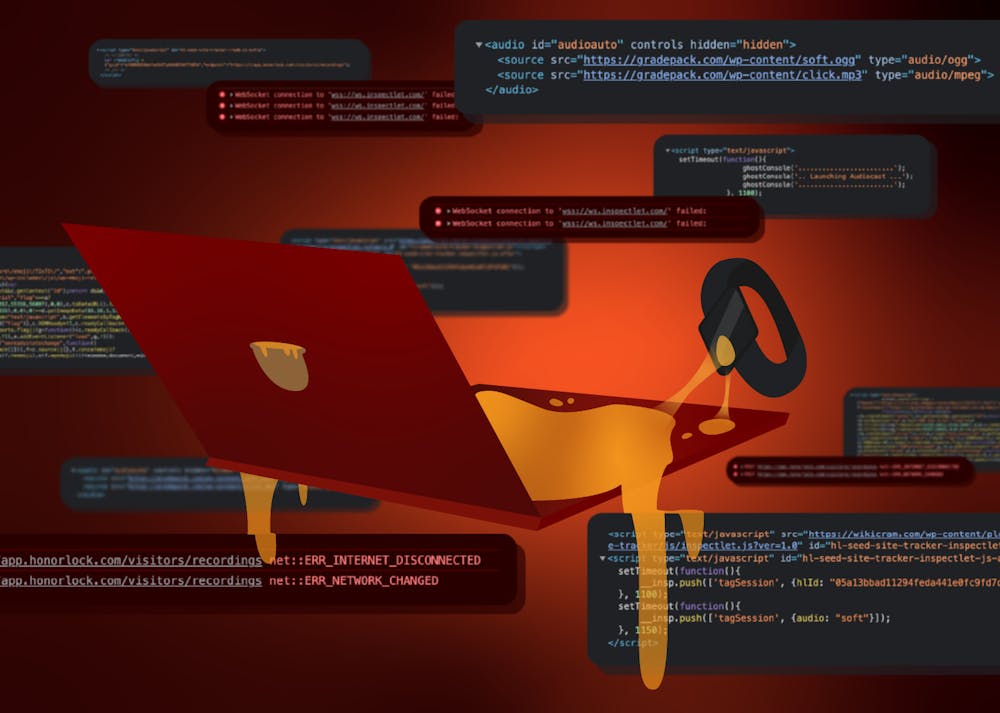Last month, an Ohio district court ruled that a room scan prior to an online test, like the ones required in some exams at ASU, violated a student’s constitutional right to privacy.
While ASU's use of online proctoring services isn't directly implicated by the Ohio decision, ASU has a decision to make about continuing to use them.
ASU has a three-to-five year commitment with Honorlock, which was named in the Ohio ruling, as a proctoring solution for iCourse and oCourse classes. But it’s important the University doesn’t continue a precedent that eats away at our personal liberty.
If ASU takes pride in its charter, it should remember that it expresses a fundamental commitment to the “economic, social, cultural and overall health of the communities it serves.” Threats to privacy directly counter the social health of the ASU community.
When asked for comment about the ruling, Tess Mitchell, Honorlock’s chief marketing officer, provided a link to the company's FAQ page, which defends the correct use of room scans as a best practice. It also correctly cautions that the Ohio district court decision is limited to a specific set of facts, is not a national ruling, and may be appealed.
Kahlea Cranford, manager for Learning Experience Support with the University Technology Office, said in an email that they understand there is uncertainty regarding the ASU policy for online proctoring. An ASU spokesperson confirmed that the policy is currently being reviewed.
Nothing can be said about Honorlock that isn’t already addressed in the nearly 2,500 Google reviews — which average a one-star rating — or the online petition for ASU students, who have signed to "Stop ASU from forcing Honorlock on students," which had 139 signatures at time of publication. Signers note that the monitoring is an invasion of privacy, an abuse of power and that students paying tuition should not be subjected to "network snoopers."
Similar petitions on campuses across the country echo those concerns and have raised others. Online proctoring services require complete privacy, creating issues for students living at home or with roommates, and invalidate a test if there’s movement in the background. They can pause while the clock continues to run if the tester is too fidgety, if their head is not positioned properly, or if there is background noise.
The name "Honorlock" is as patronizing as the presumption of guilt that led to this tormenting practice. Honor implies trust. There’s no honor in being physically locked out of an opportunity to make a choice — the honor comes from making the right choice. It seems the academic integrity pledge that students often sign at the beginning of courses wasn’t enough.
ASU claims Honorlock “stops cheating as it is happening.” That might be true, unless a student knows how to Google “how to cheat honorlock." There are articles. There are videos. There are Reddit threads.
Providing these aren't meant to condone cheating, or to endorse these methods, but they do show that innovative students can find ways to deceive the invasive gaze of online proctors.
What’s honorable about a service that’s cheatable, intrusive and adds stress to a community of students already struggling with anxiety?
The truth is it’s the academic integrity of the University being shielded from shifty students who can’t be trusted. For Honorlock, that shield, ASU could be charged nearly $4.5 million for five years of use.
READ MORE: From detecting phones to using decoy sites, Honorlock raises online test surveillance concerns
There’s much more at stake than student mental health or academic integrity, though. As we grow increasingly comfortable with technology, we’re blurring the lines between public and private spaces in ways the government could exploit.
Ben McJunkin, an associate law professor and associate deputy director of the Academy for Justice at ASU said the Supreme Court has already decided a number of cases with a troubling trend: The more we grant public access to spaces like our bedrooms, the less we can claim that they’re private.
“If technology continues to change in a way that we have consistently invited an undiscriminating public into our private spaces, we’re gonna have less constitutional protection against the government," McJunkin said.
In other words, if you "BeReal" in your bedroom, the government may think that implies you are fine with them coming in as well. McJunkin calls this reasoning “horrifically misguided,” but warns there is justifiable concern over the potential consequences.
“I am delighted but shocked at the things my students are willing to share with me about their personal lives,” said Jessica Berch, a lecturer at the Sandra Day O'Connor College of Law. “And remember, the definition of search is: ‘is this something you subjectively tried to keep private?’ And 'is it objectively reasonable?' If you’re vomiting out all of this information, that puts a lot of pressure on that.”
Intruders can argue that accessing someone’s bedroom isn’t a search if the student doesn’t keep it private. The defense representing Cleveland State made a version of this argument in the Ohio ruling — which Honorlock reminds us might still be appealed. ASU shouldn’t wait to find out.
With information accessible everywhere, Catherine O'Donnell, a professor of history in the School of Historical, Philosophical and Religious Studies, believes professors should work with the University to design assessments that show students understand how to use information, support arguments and think creatively.
While O'Donnell is sensitive to the challenges that professors face, like designing exams for courses with a large number of students and ensuring knowledge has been gained, she agrees with what she has heard from students: that Honorlock is oppressive and ineffective.
“Can ASU put more of its energy and more of its resources to helping faculty create gradable assessments at scale, to helping faculty figure out how to educate for mastery rather than focus on sorting and grading and gatekeeping?” O’Donnell said.
ASU has three main choices: it can do nothing, it can change the policies, or it can end the practice altogether. Berch said if it changes the policies based on the ruling, they may actually choose to increase the use of room scans to avoid the appearance that scans are being used arbitrarily.
Searches can be reasonable without a warrant if they’re applied to everyone, like airport security. When flying, we’re effectively offered a binary choice — fly and be searched or don’t fly. Choosing to allow ourselves to be searched is a tradeoff for flying on an airplane.
ASU must do the honorable thing: recognize its fundamental responsibility to our community, and that not giving students a choice in sharing what they could otherwise keep private is eroding the rights of students.
It must revise its policies to allow students to opt out of room scans, if not stop the practice altogether. If not, they may be complicit in locking us into a future where we have no choice at all.
Edited by Sadie Buggle, Grace Copperthite and Greta Forslund.
Reach the columnist at jdbrow52@asu.edu and follow @jamesbrownasu on Twitter.
Editor's note: The opinions presented in this column are the author's and do not imply any endorsement from The State Press or its editors.
Want to join the conversation? Send an email to opiniondesk.statepress@gmail.com. Keep letters under 500 words and be sure to include your university affiliation. Anonymity will not be granted.
Like The State Press on Facebook and follow @statepress on Twitter.

James Doyle Brown, Jr. is an opinion columnist at The State Press. He is also in his final semester as a graduate student studying investigative journalism at the Walter Cronkite School of Journalism and Mass Communication. He has previously reported for the State Press politics desk, The Howard Center of Investigative Journalism and Carnegie-Knight News21.




